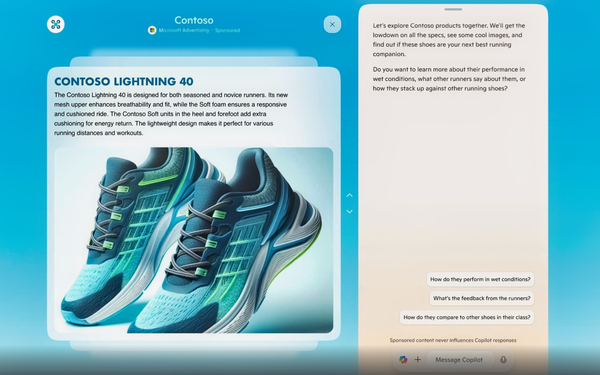Microsoft Brand Agent Rolls Out In April, Powered By Copilot
- by Laurie Sullivan @lauriesullivan, March 5, 2025

Microsoft Advertising has found that AI can not only
generate the information users want most from a query, but can analyze and determine future intent based on the signals it receives direct from the user.
Based on that understanding,
Microsoft on Wednesday released a series of advertising products that support advertising, retail, gaming and more based on its AI technology.
Showroom Ads, one product announced that will
head into pilot with a select group of retailers in April, will dynamically change the content on the screen to provide the personalized information each consumer interaction requires. It is powered
by Copilot.
Consumers will search for a product that the technology will retrieve. The consumer then will have the opportunity to ask questions and understand the product's details. The
information will come from the company's website, as well as reviews from specific sites across the web.
advertisement
advertisement
The conversation with Copilot will give the retailer a sense of the consumer's intent to make a purchase and what is required to complete the sale by analyzing the conversation.
If a user begins to ask questions Copilot questions about a particular product and expresses purchase intent, they may be invited to enter a Showroom Ads experience that highlights the product's benefits.
Microsoft explains in a blog post that this immersive experience allows users to interact with products in a way that closely mirrors the experience of visiting a physical showroom. in the future, Microsoft plans to integrate a brand agent that will allow consumers to interact directly with the representative.
Brand agents will become the expert that a consumer would expect from an in-person interaction.
Microsoft’s pilot for Dynamic Filters will roll out this month in English. The feature, which refines searches, eliminates the need for consumers to type additional questions that narrow their options based on an individual’s preferences.
Dynamic Filters led Microsoft to test the ability to use query signals to dynamically create ads in Dynamic Search Ads (DSA). The move improved DSA click-through rates by 20%, the company said.
The feature will soon be used to apply additional signals to personalize ads, such as location and seasonal events. Microsoft said it will extend this to copy generation and image selection for each user's context, and will be bringing it to new campaign types such as Performance Max.
Microsoft Advertising also brought ads to gaming and Windows, announcing App campaigns across some of its properties. Brands can now reach into King and Microsoft Casual Games via the Microsoft Advertising Platform.
Brands can promote apps on games like Candy Crush across Android, iOS, and Windows.
The App campaigns are also coming to the Windows start menu, used by more than 1 billion people worldwide, and the Microsoft Store. The App campaigns pilot has just begun with select clients, and should become open to new clients soon.


